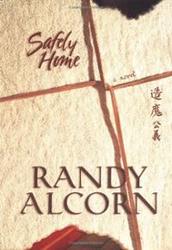
A few years ago, I put together a China reading list that I titled "My Literary Journey to Being a Sinophile" for my personal blog in which I highlighted books that have shaped my understanding and love for China over the past thirty years. The book topics run the gamut from history to contemporary society to the condition of the church. The book Safely Home (2003) by Randy Alcorn is not on the list.
Last month I wrote a post recommending ten books specifically about the church and Christianity in China. Again, I left Safely Home off the list. Many wonder why. I know the book has been (and continues to be) popular among Christians in the West, so writing a negative review and recommending that it not be read may be unpopular. Oh well; it's good to hear dissenting views once in awhile, right?
Early on in the book, when the main Chinese character (Quan) and the main American character (Ben) are having a rather heated discussion on the condition of the church in China, Quan makes this statement regarding what Ben has seen and heard: "You are telling a truth—a truth that misleads." In my opinion, this is a good description of the book.
The primary way in which the book is misleading is that it mixes up time. Alcorn sets the book in the early 2000s but the anecdotes, conditions, and events he weaves into his story are all straight out of the 1970s and 1980s, without any suggestion or hint that perhaps things have changed in China. Even a detail like filling out customs forms was out of date. Ben was instructed to "fill out a form saying what you're bringing into the country, then be sure to take the exact amount out, be it electronic goods or Bibles." By the time Alcorn wrote the book in 2003, China had already discontinued their use of customs forms—seven years previous! This would have been an easy detail to "fact check."
He talks about Chinese not being allowed into 5-star hotels. That may have been true in 1983 (it was, because I personally experienced it when I tried to take a Chinese friend to a 5-star hotel for a meal), but to suggest that it was still true in 2003 is nothing short of absurd, and again, smacks of lazy research.
Secondly, it perpetuates numerous myths about the Three-Self churches. These include the prohibition of preaching about the resurrection or the second coming. Again, there may have been a time when this was true, but by the time he wrote the book, it was already not true. When I first read the book 10+ years ago I wished I could have taken Alcorn to any of the Three-Self churches in Beijing (where I was living at the time) on Easter morning, so that he could hear the truth of the resurrection loudly and forcefully proclaimed to standing room only crowds. I have also heard numerous sermons in Three-self churches about the second coming and have regularly sung the hymn "Jesus Shall Reign Where'er the Sun." This would be even more true now.
Thirdly, it gives the impression that persecution is the normal experience for most Christians in China. While that was true in the 1970s (and into the 1980s) it is not true today, nor was it true when he wrote the book.
From the perspective of someone who spends a lot of time trying to educate people about China and the church in China, I feel like Safely Home has done more to set back western understandings and perceptions of the church in China than any other book. The sooner that it is out of circulation, the better.
Image credits: d-221 books, by az, via Flickr, and Tower Books.

Joann Pittman
Joann Pittman is Vice President of Partnership and China Engagement and editor of ZGBriefs. Prior to joining ChinaSource, Joann spent 28 years working in China, as an English teacher, language student, program director, and cross-cultural trainer for organizations and businesses engaged in China. She has also taught Chinese at the University …View Full Bio
Are you enjoying a cup of good coffee or fragrant tea while reading the latest ChinaSource post? Consider donating the cost of that “cuppa” to support our content so we can continue to serve you with the latest on Christianity in China.